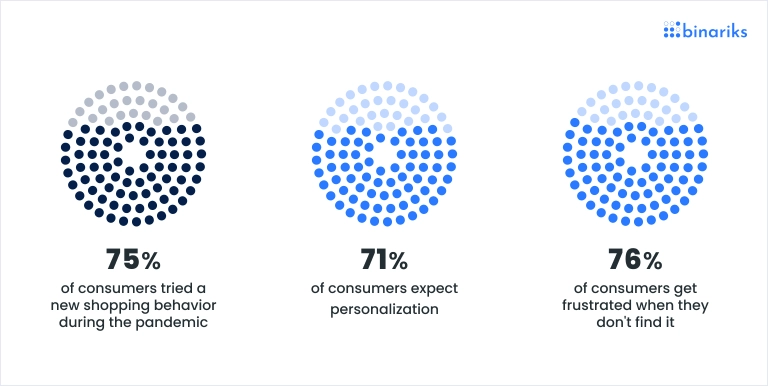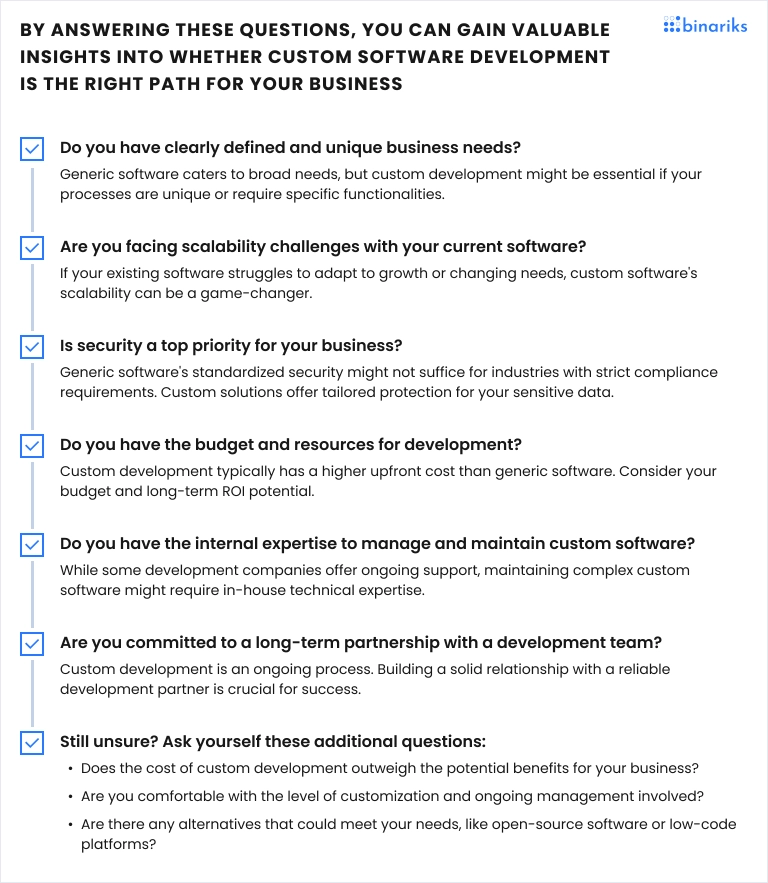You'll probably agree that your software shouldn't feel like a hand-me-down suit – Ill-fitting, restrictive, and perpetually on the verge of a wardrobe malfunction. Check out the benefits of custom software development, a sartorial masterpiece tailored to your unique business needs, boosting your agility, innovation, and competitiveness.
But wait, isn't off-the-shelf software more accessible and cheaper? In fact, while generic solutions offer the allure of plug-and-play simplicity, they often come at the cost of inflexibility, inefficiency, and the nagging feeling that you're settling for something… less.
This article is your guide to the benefits of custom software development. We'll delve into the advantages of custom software , answer the burning question of "Should I or shouldn't I?", navigate the pricing puzzle, and help you choose the right development partner . It's time to ditch the off-the-rack limitations and tailor your software for success.
Deep understanding of custom software development
The software development industry is experiencing rapid growth, with continued expansion anticipated as more companies transition to virtual environments. This sector is pivotal for numerous businesses, enhancing customer experiences, introducing feature-rich and innovative products to the market, and unlocking new revenue and cost-saving opportunities.
Citing McKinsey, 71% of customers now anticipate personalized solutions from the brands they engage with, and 76% express frustration when companies fail to deliver such personalized experiences. Given the increasing demand for customized solutions, businesses seeking a competitive edge find custom software development indispensable (Source ).

However, the importance of custom software development and personalization extends beyond meeting customer demands.
Notably, faster-growing companies derive 40% more revenue from personalization than their slower-growing counterparts. This underscores personalized approaches' crucial role in driving success and fostering positive customer experiences in today's dynamic business environment .
At the same time, some features and benefits of custom software may go unnoticed by the company's end-users but, without exaggeration, revolutionize its internal processes. These changes (like cost reductions, automation, speeding up service delivery, etc.), in turn, will make it possible to enhance overall customer outcomes.
After all, the relationship between custom software development and company success is multifaceted. You will need resources to invest in custom software development, and simultaneously, custom software can be a critical factor in your business success.
Custom software vs. generic software
Remember that made-to-measure suit analogy from before? Unlike its off-the-shelf counterpart, custom software isn't built on a predefined template. Instead, it's meticulously crafted from scratch, line by line, code by code, to reflect the unique DNA of your business.
Does it automatically mean that generic software has no place in business? Not by any means, but everything has its time and place.
By comparing the ready-made solutions and custom software development benefits and features, you can make informed decisions based on your specific needs.
| Feature | Custom Software | Generic Software |
| Functionality | Tailored to your needs, eliminating workarounds and limitations. Offers a perfect fit for your unique workflows and processes. | Provides predefined features that may not perfectly align with your specific requirements. Expect compromises and workarounds. |
| Flexibility | Highly adaptable to changes due to its modular architecture. Easily scales and integrates with new technologies. | Limited flexibility due to its predefined structure. Adapting to changes can be challenging and expensive. |
| Security | Offers enhanced protection through custom access controls, data encryption, and vulnerability patching. | Relies on generic security measures, potentially leaving vulnerabilities. Patching often depends on the vendor's schedule. |
| Efficiency | Automates repetitive tasks and optimizes workflows, boosting team productivity. | May require manual workarounds for tasks not covered by built-in features, hindering efficiency. |
| Cost | May have higher upfront cost due to development time and resources. However, consider it an investment in long-term efficiency and growth. | Typically more affordable initially, but hidden expenses like integrations, modules, and maintenance fees can add up. |
| Integration | Seamlessly integrates with existing systems and infrastructure, streamlining operations. | Integration with existing systems might require additional effort and cost because of incompatibility. |
| Scalability | Thanks to its modular architecture, it easily scales to accommodate future growth and changing needs. | Has scalability limitations. Significant growth might require switching to a new system, incurring additional costs. |
| Maintenance | Ongoing maintenance and updates are often included in the development contract, ensuring software remains secure, optimized, and aligned with your needs. | May require separate maintenance contracts or in-house expertise, adding to costs and delaying critical updates. |
| Competitive Advantage | Provides a unique edge by addressing your specific challenges and opportunities, setting you apart from competitors using generic solutions. | Lacks differentiation as competitors might be using the same software, hindering your ability to stand out in the market. |
Elevate your business with Binariks' custom software development services
5 key benefits of custom software development
The comparison between custom and off-the-shelf software continues to be a significant consideration for businesses, with one fact standing clear: selecting the right solution can yield considerable, transformative benefits for your organization.
Following an analysis of their strengths and weaknesses, we now focus more closely on the distinct advantages of custom software development.
1. Efficiency unleashed
- Eliminate repetitive tasks like data entry, report generation, and manual calculations, freeing up your team for strategic thinking and innovation.
- Custom software tailors to your unique processes, optimizing every step and eliminating unnecessary clicks.
- Empower your team to achieve more with less. Reduced manual work translates to increased output, faster turnaround times, and happier employees.
Example: Leveraging License Plate Recognition (LPR) technology, the system recognizes repeat customers, offering a personalized experience. Additionally, predictive ordering and menu optimization, driven by AI algorithms, ensure swift and tailored service, adjusting menu displays based on the time of day and local preferences.
This AI-powered approach at McDonald's drive-through guarantees order accuracy through real-time customization and maximizes efficiency with real-time data analysis and recommendations. Integration with the mobile app further elevates the customer experience, enabling convenient ordering and pickup.
By seamlessly merging technology with operations, McDonald's strives to reduce wait times, enhance order accuracy, and elevate the overall drive-through experience.
2. Bespoke fit
- Generic software often makes you adapt to its limitations, forcing you to contort your processes. Custom software eliminates frustrating workarounds and compromises.
- Custom software conducts a harmonious flow of data across your entire ecosystem.
- With custom development, your unique workflows become the software's core. Forms are instantly filled with relevant data, approvals are automatically triggered based on your specific criteria, and tasks are initiated according to established procedures.
Example: Unilever has transitioned from "doing digital" to "being digital," aiming for a comprehensive digital transformation. The company has developed a self-driving supply chain, utilizing RPA to streamline operations. Unilever's commitment to digital literacy and transparency is evident in its efforts to educate the entire organization, leveraging quick wins in automation to showcase tangible benefits.
Unilever's Vietnam factory, with 1.400 employees, excels as a highly efficient manufacturer in the region. The success is attributed to a modern production line supported by technology.
Thus, Unilever implemented a production planning and auto-weighting system, utilizing machine learning, AI, and IoT for optimal analytics and prediction.
The system, accessible via web and mobile apps, provides real-time updates and forecasts. Using AI and cameras, the auto-weighting system automates truck position detection with precision. Six months after adoption, the results were impressive:
- 10% reduction in changeover costs;
- 80% decrease in administrative time for production planning;
- streamlined truck inspection, saving time and resources;
- improved data accuracy.
3. Fort Knox-like security
- Generic software's one-size-fits-all security might leave you vulnerable. In contrast, security is definitely one big benefit of custom software. Custom solutions address your needs with granular access controls, robust encryption, and proactive vulnerability patching.
- You have complete control over your security posture, safeguarding your intellectual property and competitive advantage.
- Meet industry regulations and internal security standards with confidence. Custom software ensures your data remains protected and compliant, avoiding costly fines and reputational damage.
4. Future-proof scalability
- Tailor-made software solutions scale effortlessly alongside your business. Add new users, integrate new technologies, and modify workflows seamlessly as your needs evolve.
- The dynamic business landscape demands agility. Custom software adapts to market shifts, new opportunities, and unforeseen challenges.
- Think of custom software as a future-proof investment. Its adaptability avoids costly software replacements, keeping your technology aligned with your evolving needs.
Example: Air Canada transformed its operations and revenue management with a custom ticketing and financial application, breaking away from legacy technologies.
This tailored system introduced an advanced ticket-pricing model, seamlessly integrating with back-office operations for improved revenue management and financial reporting. The custom solution also harmonized agency commissions, giving Air Canada precise control over profitability.
Results? Air Canada's strategic adoption of custom software wasn't just about staying ahead but optimizing revenue and enhancing operational agility. Custom software development provides the flexibility and scalability to navigate dynamic industry landscapes.
5. Seamless integration
- Efficient communication among tools is crucial for desired outcomes, ensuring seamless collaboration and optimal performance.
- Custom solutions are designed to align with a company's existing systems and processes, minimizing disruptions and maximizing operational synergy.
- Well-integrated systems provide real-time visibility into business operations, offering insights that aid in proactive decision-making.
- Integration enables accurate data management and analysis, enhancing the reliability and precision of business information.
Example: FedEx Ship Manager exemplifies the advantages of custom software through its capacity for seamless integration with a wide array of systems and processes (both other FedEx solutions and the customers' existing IT frameworks and their shipping workflows).
This software can transform any desktop into a high-functioning shipping hub, facilitating the dispatch of packages and freight through FedEx Express, FedEx Ground, and FedEx Freight. It caters to the nuanced needs of businesses by offering direct connections to various e-commerce platforms, ERP systems, accounting software, and third-party shipping solutions.
FedEx Ship Manager automates data exchange, significantly reducing manual tasks, minimizing errors, and saving valuable time.
Is custom software development suitable or not
There are a lot of benefits of custom software development, but it's not a one-size-fits-all solution. Before diving in, it's crucial to assess your specific needs and determine if this path aligns with your business reality. Here's a checklist to help you decide:

However, custom software development isn't always the answer. While it offers immense potential, it also comes with complexities and considerations. By carefully evaluating your needs and resources, you can make an informed decision that positions your business for success.
Why custom software development isn't for everyone
While powerful, custom software development isn't without its shortcomings:
- Higher upfront cost: The initial investment can be significant compared to generic software, requiring careful financial planning.
- Development time: Building custom software takes time, potentially delaying project timelines and impacting immediate needs.
- Ongoing maintenance: Unlike generic software with fixed updates, custom solutions require ongoing maintenance and support, adding to operational costs.
- Technical expertise: Managing and maintaining complex custom software might necessitate in-house technical expertise, which not all businesses possess.
Ultimately, choosing custom software development hinges on your unique business needs, budget, and resources. Weigh the benefits against the potential drawbacks to ensure you make an informed choice that propels your business forward.
About the cost of custom software
The sticker price of bespoke software development often sparks initial hesitation. While it's true that custom solutions typically carry a higher upfront cost compared to off-the-shelf software, it's crucial to view this investment through a holistic lens.
Providing a one-size-fits-all answer is difficult, as costs vary greatly based on individual project needs. However, as a general guideline, expect custom software development to range from:
- $50.000 to $200.000 for smaller projects or mobile apps
- $120.000 to $220.000 for more complex web applications
- $500.000 or more for enterprise-level solutions
Here's a breakdown of the cost factors:
- Project complexity: The more intricate your requirements and desired functionalities, the more development time and resources will be involved, impacting the cost.
- Development team location: Hourly rates for developers can vary depending on their location, with regions like Eastern Europe generally offering lower costs than Western European and the US counterparts.
- Features and integrations: The number of features, desired level of customization, and need for third-party integrations all influence the overall cost.
- Ongoing maintenance: While some development companies include maintenance in their initial offering, others require separate contracts.
So, where do you find the "better" prices? It's not always about chasing the lowest hourly rate. Look for experienced development partners with a proven track record in your industry, strong communication skills, and a transparent pricing structure.
While navigating the custom software development landscape, check out Binariks. Our experienced professionals craft exceptional solutions for businesses of all sizes and across diverse industries. We believe in fostering strong partnerships and collaborating closely with you throughout the entire development process.
Remember: the cheapest option might not always be the most cost-effective in the long run!
Secure Messaging Platform
We merged the client's multiple apps' features into a single highly-scalable product.
How to choose custom development partner
Embarking on custom software development is an exciting yet potentially daunting journey. Here are some best practices and tips to guide you to ensure smooth sailing and a successful outcome.
Choosing your development partner:
- Prioritize communication: Look for a company that values open and transparent communication, actively listens to your needs, and readily addresses your concerns.
- Evaluate technical expertise: Ensure the development team possesses the technical skills and experience to fulfill your project requirements. Consider their experience with specific technologies and development methodologies.
- Assess cultural fit: Finding a partner that shares your values and work style is crucial. A good cultural fit fosters collaboration, trust, and a productive working relationship.
- Negotiate the contract: Carefully review the development contract, ensuring it clearly outlines project scope, deliverables, timelines, costs, and intellectual property ownership.
Additional tips:
- Start small: Consider a pilot project or an MVP (minimum viable product) to test the waters and establish a strong foundation for future collaboration.
- Involve stakeholders: Keep key stakeholders informed and engaged throughout development to ensure alignment and buy-in.
- Embrace feedback: Provide constructive feedback regularly and encourage open communication to ensure the final product meets your expectations.
Make your custom software with Binariks
The journey to custom software development can be transformative, yet navigating it requires careful planning and choosing the right partner. By clearly defining your needs, conducting thorough research, and prioritizing communication, you can lay the foundation for success.
Binariks stands ready to be your trusted guide on this exciting path. With over 20 years of experience and a proven track record across diverse industries , we possess the expertise to craft tailored software solutions that perfectly align with your unique business challenges and goals.
Here's how we can help:
- Expert consultation : We collaborate closely with you to understand your vision, challenges, and long-term objectives.
- Seamless communication: We prioritize open and transparent communication , keeping you informed at every step of the development process.
- Technical prowess: Our skilled team possesses the expertise and experience to tackle complex projects across various technologies.
- Custom solutions: We craft software that seamlessly integrates with your existing systems and workflows.
- Competitive pricing: We offer transparent and competitive pricing models, ensuring you get the most value for your investment.
- Long-term partnership: We believe in building lasting relationships with our clients, providing ongoing support and ensuring your software evolves alongside your business.
Ready to unlock the transformative power of custom software? Binariks is here to be your trusted partner in this exciting endeavor. If you're looking for an experienced, reliable, and communication-driven team to bring your software vision to life, don't hesitate to reach out. We're passionate about crafting tailor-made solutions that empower your business success.
Share

